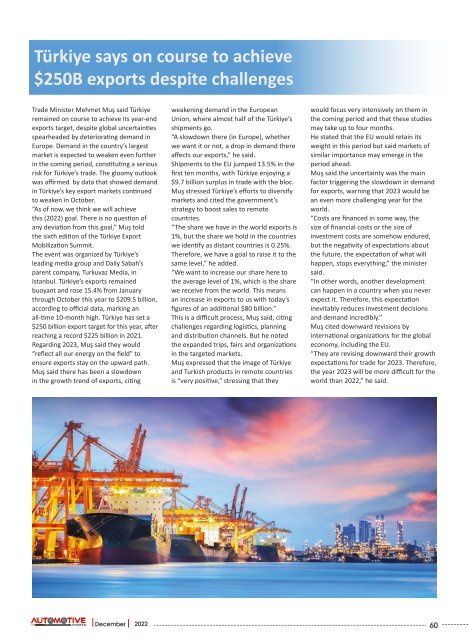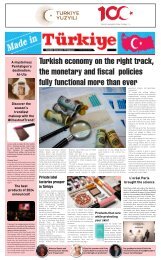Automotive Exports December 2022
You also want an ePaper? Increase the reach of your titles
YUMPU automatically turns print PDFs into web optimized ePapers that Google loves.
Türkiye says on course to achieve<br />
$250B exports despite challenges<br />
Trade Minister Mehmet Muş said Türkiye<br />
remained on course to achieve its year-end<br />
exports target, despite global uncertainties<br />
spearheaded by deteriorating demand in<br />
Europe. Demand in the country’s largest<br />
market is expected to weaken even further<br />
in the coming period, constituting a serious<br />
risk for Türkiye’s trade. The gloomy outlook<br />
was affirmed by data that showed demand<br />
in Türkiye’s key export markets continued<br />
to weaken in October.<br />
“As of now, we think we will achieve<br />
this (<strong>2022</strong>) goal. There is no question of<br />
any deviation from this goal,” Muş told<br />
the sixth edition of the Türkiye Export<br />
Mobilization Summit.<br />
The event was organized by Türkiye’s<br />
leading media group and Daily Sabah’s<br />
parent company, Turkuvaz Media, in<br />
Istanbul. Türkiye’s exports remained<br />
buoyant and rose 15.4% from January<br />
through October this year to $209.5 billion,<br />
according to official data, marking an<br />
all-time 10-month high. Türkiye has set a<br />
$250 billion export target for this year, after<br />
reaching a record $225 billion in 2021.<br />
Regarding 2023, Muş said they would<br />
“reflect all our energy on the field” to<br />
ensure exports stay on the upward path.<br />
Muş said there has been a slowdown<br />
in the growth trend of exports, citing<br />
weakening demand in the European<br />
Union, where almost half of the Türkiye’s<br />
shipments go.<br />
“A slowdown there (in Europe), whether<br />
we want it or not, a drop in demand there<br />
affects our exports,” he said.<br />
Shipments to the EU jumped 13.5% in the<br />
first ten months, with Türkiye enjoying a<br />
$9.7 billion surplus in trade with the bloc.<br />
Muş stressed Türkiye’s efforts to diversify<br />
markets and cited the government’s<br />
strategy to boost sales to remote<br />
countries.<br />
“The share we have in the world exports is<br />
1%, but the share we hold in the countries<br />
we identify as distant countries is 0.25%.<br />
Therefore, we have a goal to raise it to the<br />
same level,” he added.<br />
“We want to increase our share here to<br />
the average level of 1%, which is the share<br />
we receive from the world. This means<br />
an increase in exports to us with today’s<br />
figures of an additional $80 billion.”<br />
This is a difficult process, Muş said, citing<br />
challenges regarding logistics, planning<br />
and distribution channels. But he noted<br />
the expanded trips, fairs and organizations<br />
in the targeted markets.<br />
Muş expressed that the image of Türkiye<br />
and Turkish products in remote countries<br />
is “very positive,” stressing that they<br />
would focus very intensively on them in<br />
the coming period and that these studies<br />
may take up to four months.<br />
He stated that the EU would retain its<br />
weight in this period but said markets of<br />
similar importance may emerge in the<br />
period ahead.<br />
Muş said the uncertainty was the main<br />
factor triggering the slowdown in demand<br />
for exports, warning that 2023 would be<br />
an even more challenging year for the<br />
world.<br />
“Costs are financed in some way, the<br />
size of financial costs or the size of<br />
investment costs are somehow endured,<br />
but the negativity of expectations about<br />
the future, the expectation of what will<br />
happen, stops everything,” the minister<br />
said.<br />
“In other words, another development<br />
can happen in a country when you never<br />
expect it. Therefore, this expectation<br />
inevitably reduces investment decisions<br />
and demand incredibly.”<br />
Muş cited downward revisions by<br />
international organizations for the global<br />
economy, including the EU.<br />
“They are revising downward their growth<br />
expectations for trade for 2023. Therefore,<br />
the year 2023 will be more difficult for the<br />
world than <strong>2022</strong>,” he said.<br />
<strong>December</strong> <strong>2022</strong> 60

















